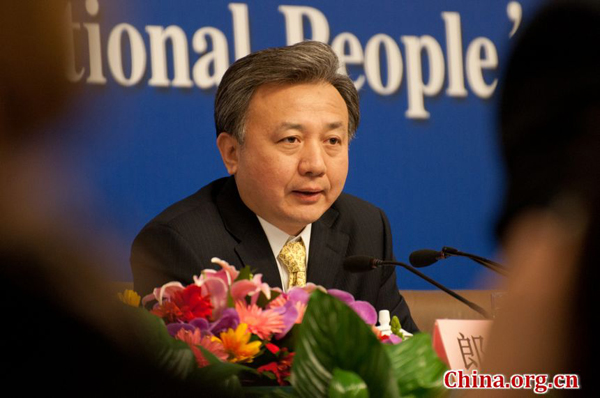Lang Sheng: there's no 'secret detention' in China
- By Li Jingrong
 0 Comment(s)
0 Comment(s) Print
Print E-mail China.org.cn, March 9, 2012
E-mail China.org.cn, March 9, 2012
A senior Chinese lawmaker on Thursday denied "secret detention"in China, saying the allegation has no grounds in law.
 |
|
The Legislative Affairs Commission of the 11th National People's Congress holds a press conference in Beijing on March 8, 2012. The commission's Vice Director Lang Sheng answers questions concerning the amendments to the Criminal Procedure Law. [Photo by Chen Boyuan] |
Lang Sheng, vice director of the Law Committee of the National People's Congress (NPC) Standing Committee, answered questions concerning the draft amendments to China's Criminal Procedure Law during a press conference of the Fifth Session of the 11th NPC. (Gallery>>>)
Lang said that according to a provision in the amendments, detainees' families should be notified within 24 hours, except when impossible, or when they are involved in crimes concerning state security or terrorism, and notification could obstruct investigations.
Lang explained that circumstances of detention without notifying detainee's families are very few exceptions.
"First, when detainees are involved in crimes concerning state security or terrorism and if they don't obstruct investigation, families need to be notified. Only in the case of obstruction to investigation, families may not be notified. Second, as soon as obstruction to investigation disappears, families need to be immediately notified. Third, detention is a temporary, urgent and coercive measure,"Lang said.
Lang stressed that there is no"secret detention"in China and current laws have no such provision.
When asked about how to provide relief in the process of residential surveillance, Lang pointed out that residential surveillance is an alternative measure for arrest. It is a coercive measure lighter than arrest which restricts personal freedom, he said.
Lang said residential surveillance may be executed under certain circumstances, including the persons concerned suffering from serious illness and unable to take care of themselves; being pregnant or nursing; being the only dependents of people who cannot take of themselves; or at the expiration of arrest.
He pointed out that the draft amendments of the Criminal Procedure Law clearly stipulate that residential surveillance needs to accept supervision of procuratorial organs. Lawyers can provide legal assistance while procuratorial organs should supervise the process according to law.





